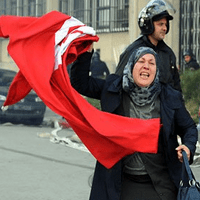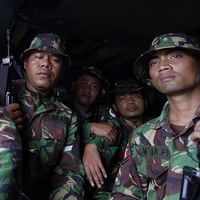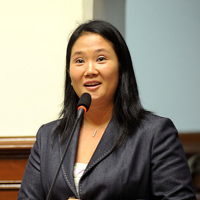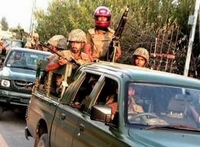In an attempt to salvage his 24-year hold on power, Burkina Faso’s president, Blaise Compaore, has responded to mounting unrest in the West African nation by dissolving his cabinet and sacking the country’s top military commanders — hasty moves made early this week after soldiers, protesting over undelivered housing allowances, began looting parts of the capital. While his goal may be to mollify angry demonstrators, Compaore is ultimately doing what “[Hosni] Mubarak tried to do and what [Zine El Abidine] Ben Ali tried,” says David Shinn, a former U.S. ambassador to Burkina Faso, now at George Washington University’s Elliot School […]
Domestic Politics Archive
Free Newsletter

Although events in the Middle East confirm that the power of an angry crowd in a public square remains potent, the Internet is fast becoming the medium of choice for spreading political ideas. The number of global Internet users has doubled during the past five years, and now exceeds 2 billion people. In response, governments worldwide are seeking new means to influence and often control this discourse. Freedom House’s newly released report, “Freedom on the Net 2011: A Global Assessment of Internet and Digital Media” (.pdf), shows how governments have employed deviously creative tactics to control Web sites, blogs and […]
Tension simmered in Yemen on Monday after a fruitless meeting with Gulf mediators and violent late night demonstrations in Sanaa. Late on Sunday, hundreds of thousands protested against President Ali Abdullah Saleh’s call for an end to men and women demonstrating together against the regime, and called for his departure.
Finland’s pro-Europe National Coalition led by Finance Minister Jyrki Katainen has won Finland’s general election but is set to form a government with the country’s anti-euro bloc.The unlikely pairing which is considered a major political upset also bodes ill for Portugal’s bailout package as the euro-sceptics have threatened to oppose its rescue plan.

One of the main causes of the uprisings in Tunisia and Egypt was the frustration that millions of Tunisians and Egyptians felt with the state of their economies. Among their many grievances, citizens of both countries were especially fed up with inequality, high unemployment and corruption. Yet the uprisings have led to a further deterioration of economic conditions in both countries. International tourists are staying away, and tourist facilities have laid off thousands of workers. Increased economic uncertainty has also led international investors to stay away for now. To make matters worse, some labor unions have taken advantage of the […]
The uprising against the 41-year rule of Libyan leader Moammar Gadhafi began peacefully. But when government troops used force to suppress the demonstrations, they escalated into what increasingly looks like a civil war. Opposition forces, based mostly in the east, are fighting the much better-equipped and better-trained Gadhafi troops. But their leaders are trying to change that.
Calls by demonstrators for greater political freedoms are getting louder in Damascus and, according to reports from Aleppo, Syria’s second city, one hundred anti-government protesters have demonstrated at the main university there. Three students have been arrested in what is thought to be the city’s first demonstration during the recent wave of unrest.

DENPASAR, Indonesia — The recent spate of popular uprisings in the Middle East has surprised and captivated public attention. It is now widely expected that policymakers in Washington, Brussels and the U.N., among others, will draft pro-democracy aid packages for the region, many of which will focus on security sector reform (SSR). This is a welcome development, but in the rush to support Egypt, Tunisia and possibly Yemen and Libya, aid donors should not forget countries that are already going through a similar process. Indonesia is a case in point. The archipelago nation, with its 240 million inhabitants, happens to […]

When Peruvians went to the polls on April 10 to choose a new president, they faced an uncommon variety of choices. The fractured vote left no one with the required majority, producing another extraordinary field for the second-round voting on June 5. The top two vote-getters bring minimal experience and maximum polemic. In the not-very-kind words of Mario Vargas Llosa, Peru’s Nobel Prize- winning author, it’s like “choosing between AIDS and cancer.” Peruvians hope their Nobel laureate was using hyperbole in his choice of metaphors, but though they might disagree over the reasons why, most are indeed deeply concerned about […]
Full-blown civil war may have been averted in Côte d’Ivoire, but it remains to be seen how the post-election turmoil might influence the behavior of power players in other African elections. “The most important thing in an election is not the voting process but the aftermath,” asserted a recent BBC commentary, which went on to ask, “Will losers accept the verdict? Will the winner humble the vanquished?” Richard Downie, deputy director of the Africa Program at the Center for Strategic International Studies in Washington, believes Côte d’Ivoire’s election is “a case of precedent,” particularly within the context of U.S. policy […]

On April 5, the Obama administration delivered a stark evaluation of Pakistan’s counterterrorism campaign to Congress, stating that “there remains no clear path toward defeating the insurgency” (.pdf) festering in the country’s northwestern regions. Over the past decade, militants have killed thousands of Pakistani civilians and wreaked devastation on the country’s fragile economy. And since 2001, 2,575 Pakistani soldiers have been killed in counterinsurgency and counterterrorism operations. Why, then, have Pakistan’s leaders failed to develop a comprehensive counterterrorism strategy? It is true that Pakistan has made important progress against militancy in recent years. Starting in mid-2009, the army began a […]
Egyptian Foreign Minister Nabil al-Arabi’s announcement on April 5 that Egypt is prepared to reinstate full diplomatic relations with Iran comes at a strange juncture. With popular protests still ongoing, Egypt’s domestic political scene has yet to find its feet. In addition, the trust between the people and the army has been shaken by the Supreme Council of the Armed Forces’ decision to issue an interim constitution. So why, in the midst of domestic uncertainty, has the transitional government chosen to tackle one of its most complex foreign policy conundrums — namely, Iran? Egypt’s relationship with Iran has long been […]
The first round of balloting went smoothly in Peru’s presidential election Sunday, setting the stage for a June 5 run-off between left-leaning former military officer Ollanta Humala and Keiko Fujimori, a pro-market congresswoman and daughter of jailed former President Alberto Fujimori. Humala won 31.6 percent and Fujimora 23 percent in the initial round of voting, according to the Wall Street Journal, which noted Humala’s strategy of employing “Brazilian political advisers who tried to cast him in a more moderate light, in the style of that country’s former President Luiz Inacio Lula da Silva.” If true, it apparently worked, says Christopher […]
